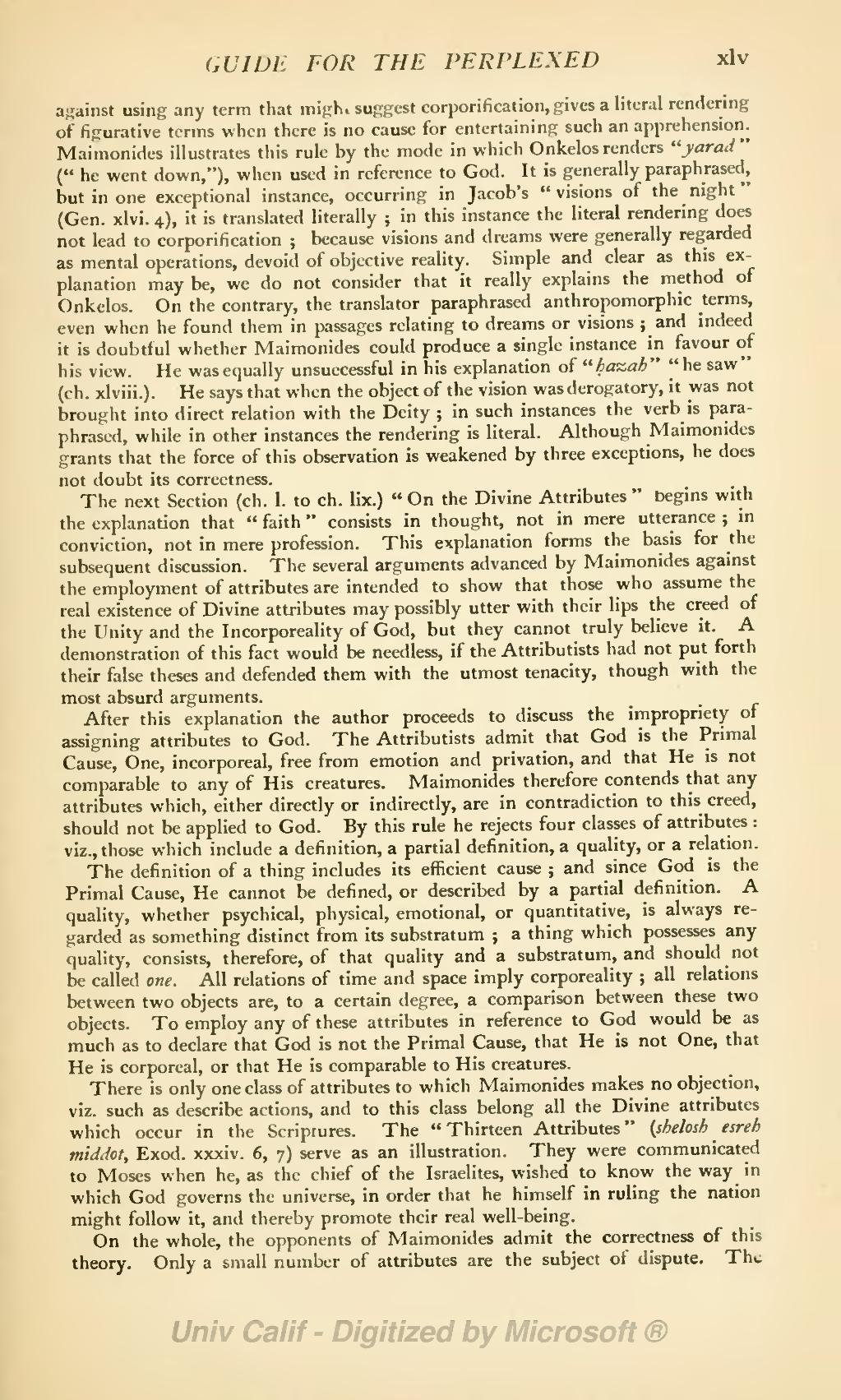using any term that might suggest corporification, gives a literal rendering of figurative terms when there is no cause for entertaining such an apprehension. Maimonides illustsatcs this rule by the mode in which Onkelos renders "yarad" (" he went down,"), when used in reference to God. It is generally paraphrased, but in one exceptional instance, occurring in Jacob's "visions of the night" (Gen. xlvi. i), it is translated literally; in this instance the literal rendering does not lead to corporification; because visions and dreams were generally regarded as mental operations, devoid of objective reality. Simple and clear as this explanation may be, we do not consider that it really explains the method of Onkelos. On the contrary, the translator paraphrased anthropomorphic terms, even when he found them in passages relating to dreams or visions; and indeed it is doubtful whether Maimonides could produce a single instance, in favour of his view. He was equally unsuccessful in his explanation of "hazah" "he saw" (ch. xlviii.). He says that when the object of the vision was derogatory, it was not brought into direct relation with the Deity; in such instances the verb is paraphrased, while in other instances the rendering is literal. Although Maimonides grants that the force of this observation is weakened by three exceptions, he does not doubt its correctness.
The next Section (ch. I. to ch. lix.) "On the Divine Attributes" begins with the explanation that "faith" consists in thought, not in mere utterance; in conviction, not in mere profession. This explanation forms the basis for the subsequent discussion. The several arguments advanced by Maimonides against the employment of attributes are intended to show that those who assume the real existence of Divine attributes may possibly utter with their lips the creed of the Unity and the Incorporeality of God, but they cannot truly believe it. A demonstration of this fact would be needless, if the Attributists had not put forth their false theses and defended them with the utmost tenacity, though with the most absurd arguments.
After this explanation the author proceeds to discuss the impropriety of assigning attributes to God. The Attributists admit that God is the Primal Cause, One, incorporeal, free from emotion and privation, and that He is not comparable to any of His creatures, Maimonides therefore contends that any attributes which, either directly or indirectly, are in contradiction to this creed, should not be applied to God. By this rule he rejects four classes of attributes viz., those which include a definition, a partial definition, a quality, or a relation. The definition of a thing includes its efficient Cause; and since God is the Primal Cause, He cannot be defined, or described by a partial definition. A quality, whether psychical, physical, emotional, or quantitative, is always regarded as something distinct from its substratum; a thing which possesses any quality, consists, therefore, of that quality and a substratum, and should not be called one. All relations of time and space imply corporeality; all relations between two objects are, to a certain degree, a comparison between these two objects. To employ any of these attributes in referencc to God would be as much as to declare that God is not the Primal Cause, that He is not One, that He is corporeal, or that He is comparable to His creatures.
There is only one class of attributes to which Maimonidcs makes no objection, viz, such as describe actions, and to this class belong all the Divine attributes which occur in the Scriptures. The "Thirteen Attributes" (shelosh esreh middot, Exod. xxxiv. 6, 7) serve as an illustration. They were communicated to Moses when he, as the chief of the Israelites, wished to know the way in which God governs the universe, in order that he himself in ruling the nation might follow it, and thereby promote their real well-being. On the whole, the opponents of Maimonides admit the correctness of this theory. Only a small number of attributes are the subject of dispute. The Scriptures
